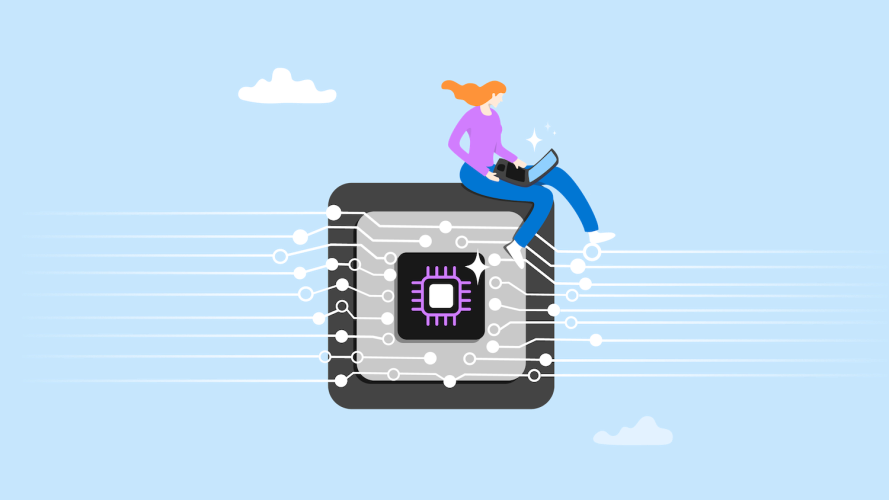Humans won’t be displaced by AI en masse, but those without AI skills may risk losing out on the next promotion. That said, here are four things you can do to make yourself invaluable to your employer in this age of data and AI.
1. Learn how to write good prompts
A prompt is what you ask GPT, or what you tell it to do. The quality and preciseness of the output (or response) depends on the quality and preciseness of the input (or prompt). Prompt engineering, which wasn’t even a thing one year ago, is now one of the hottest jobs in the generative AI field.
But you don’t have to be an engineer. If you can master the art of good prompt writing, you can perform your tasks faster and better, whatever those tasks may be: writing code or a marketing plan, analyzing data, or interacting with customers. And that makes you better at your job and, therefore, more valuable.
Action item: Check out this post for six easy (we mean it, easy!) tips on how to write better AI prompts.
2. Become data literate
We get it: Data terminology can be intimidating. But data is the absolute lifeblood of your company. It’s the stuff that informs your decisions, and surfaces new ideas, opportunities, and challenges.It’s also the bedrock of AI, providing AI systems with the massive amount of information they need to generate responses to simple and complex business problems.
Data-driven companies perform better
Data-first companies, led by people with data skills, outperform their peers. Here’s how you can become one of those valuable people.



So, bottom line, you need to understand basic data terms because doing so helps you leverage data to do your job better. It’s not as hard as you might think. For example, if you understand just the basics of business analytics, you and your team can create more accurate predictions, and make smarter decisions about resource planning, demand forecasting, and risk assessment. It’s worth stepping up your data game: The overall job outlook for people with strong data skills will grow between 21%-36% through 2031, much faster than the national average.
Action item: Here are three resources to help you get smart with data.
- A glossary of essential data terms.
- 7 key data learning modules.
- 5 tips for using data to build amazing charts (hint, no old-school pie and bar charts here).
3. Learn AI lingo and how to use AI
AI, particularly generative AI, is unlike any other enterprise technology in many ways, but mostly because it affects every level of every business function. That’s why Salesforce CEO Marc Benioff calls AI and generative AI “the most important technology of any lifetime.”
All employees will benefit greatly from learning even the most basic AI terminology and how to use AI. A recent report in Harvard Business Review noted, “You need to understand the machine learning stuff and the AI stuff, not because you’re going to become an AI engineer or AI scientist, but because this is now going to be critical table stakes for you to understand how business works.”
For example, if you understand augmented intelligence, you understand how it helps you make better decisions: A customer relationship management (CRM) system analyzes customer data to suggest the best time for sales or marketing teams to reach out, or recommend products or services that might be of interest. Pinpointing these nuances raises the chances of giving the customer exactly what they want, and (wait for it) makes you a more valuable employee.
Action item: Read and bookmark this glossary of AI terms. It will make you AI-conversant, and help you understand how these terms apply to your daily workflow. And this blog post highlights key online learning modules for using AI in business.
4. Be the human in the loop
Some jobs may be eliminated by AI, but technology by and large doesn’t put masses of people out of work. In sales, generative AI assistants can actually make salespeople better at their jobs. So it’s not AI vs. human. AI systems need humans as a check and balance, flagging and correcting inaccurate results the AI produced.
For example, human annotators are needed to help label the original data (text, video, audio, etc.) correctly, so it is inputted and understood correctly by the algorithm during training. It’s the step that, for example, helps the system distinguish between a squirrel and a chipmunk. During the testing phase, humans correct any inaccurate outputs that the AI produced.
Across marketing, sales, service, commerce, and more, AI systems and humans will align to do the job better and faster, with more accuracy and better personalization. All of that makes you a smarter, more productive, more valuable employee.
Consider customer service, a role thought to be particularly vulnerable to AI chatbots. AI can instantly give service agents intelligent recommendations pulled from knowledge bases, conversational insights, and customer data. AI eliminates rote work so agents can focus on creative problem solving, social intelligence, and complex critical thinking. These things move the needle for customer experience, and transform the agent into a key problem-solver.
Action item: AI’s effectiveness depends on humans to source huge amounts of data and train AI algorithms to perform tasks. That’s just one example of how important people are to AI’s success. Take action on the above directives. Learn about data and how it relates to AI. Have fun with generative AI by practicing writing them for your personal use, and apply that knowledge at work.
AI vs. human? More like AI and human
Continuous learning has always been important in business. How else would we advance in our careers and contribute to the company’s growth? But every person in every business function will need to get smart on AI and data, because those things are changing everything about how we do our jobs.
AI, for now, lacks cognitive capabilities like empathy, reasoning, emotional intelligence, and ethics. These are critical business skills that humans bring to the table. That’s why AI-assisted work — led by humans who understand AI — is the winning combo.




























